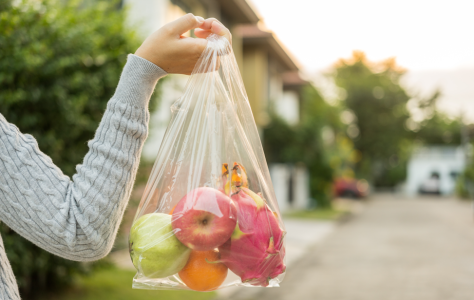Discover How Inconsistent Single-Use Plastic Policies Affect Your Shopping Experience - Retailers Speak Out!
By
Gian T
- Replies 9
As we all strive to do our part for the environment, the topic of single-use plastics has become a hot-button issue. It's no secret that these plastics are a major contributor to pollution and environmental degradation, and many of us over 60 have seen the changes in our environment over the years. We understand the importance of taking action now to ensure a cleaner, greener future for our children and grandchildren.
However, the journey towards sustainability is not without its challenges, and one of the most pressing issues is the lack of consistency in the regulations surrounding single-use plastics. This is something that has caught the attention of the Australian Retailers Association (ARA), especially with the next phase of single-use-plastics bans set to come into effect in South Australia and Western Australia from 1 September.
The ARA's CEO, Paul Zahra, has been vocal about the need for a national alignment and a more common-sense approach to the legislation. While retailers are committed to reducing plastic use and supporting the bans, the current state-by-state approach is causing inefficiencies and driving up costs. This fragmented approach means that the transition away from single-use plastics has been more costly and time-consuming than necessary.
The changes that came into effect on 1 September are significant. In South Australia, the ban includes plastic barrier bags, thick supermarket or boutique-style plastic bags, single-use plastic beverage containers including coffee cups, and expanded food and beverage containers, such as gelato tubs and polystyrene trays used for meat, fruit, and other food items. Meanwhile, in Western Australia, the ban extends to produce bags for loose fresh fruit and vegetable lids for disposable food containers, bowls, plates, and trays.
To assist retail businesses in navigating these changes, the ARA has developed an online resource, which includes on-demand webinar content and an overview of bans across the country. This is a valuable tool for retailers, but it also highlights the complexity of the current situation.
Furthermore, the ARA has raised concerns about the alternatives available to replace some of the banned items in SA and WA. According to Mr. Zahra, some of the alternative packaging could increase food safety risks and present an unreasonable burn risk to employees and customers. The ARA is advocating for an 'education before enforcement' approach to these bans, emphasising the need for practical and safe solutions.
As consumers, we may begin to notice changes in our shopping experience as retailers adapt to these new regulations. We might find ourselves using different types of bags, containers, and packaging when we purchase our groceries or takeout meals. It's important to be aware of these changes and understand why they are happening.
The move towards sustainable packaging is a positive step for the environment, but it's clear that a more coordinated approach is needed. A national framework for plastics bans would not only reduce complexity and cost for retailers but also provide clarity and consistency for consumers.
So, dear members, as we continue to support environmental initiatives, let's also be mindful of the challenges that businesses face in this transition. And let's hope for a future where sustainability and practicality go hand in hand, making it easier for all of us to make eco-friendly choices without compromising on safety or convenience.
 What are your thoughts on the single-use plastics ban? Have you noticed changes in your local stores? Share your experiences and opinions in the comments below – we'd love to hear how these environmental efforts are impacting your daily life.
What are your thoughts on the single-use plastics ban? Have you noticed changes in your local stores? Share your experiences and opinions in the comments below – we'd love to hear how these environmental efforts are impacting your daily life.
However, the journey towards sustainability is not without its challenges, and one of the most pressing issues is the lack of consistency in the regulations surrounding single-use plastics. This is something that has caught the attention of the Australian Retailers Association (ARA), especially with the next phase of single-use-plastics bans set to come into effect in South Australia and Western Australia from 1 September.
The ARA's CEO, Paul Zahra, has been vocal about the need for a national alignment and a more common-sense approach to the legislation. While retailers are committed to reducing plastic use and supporting the bans, the current state-by-state approach is causing inefficiencies and driving up costs. This fragmented approach means that the transition away from single-use plastics has been more costly and time-consuming than necessary.
The changes that came into effect on 1 September are significant. In South Australia, the ban includes plastic barrier bags, thick supermarket or boutique-style plastic bags, single-use plastic beverage containers including coffee cups, and expanded food and beverage containers, such as gelato tubs and polystyrene trays used for meat, fruit, and other food items. Meanwhile, in Western Australia, the ban extends to produce bags for loose fresh fruit and vegetable lids for disposable food containers, bowls, plates, and trays.
To assist retail businesses in navigating these changes, the ARA has developed an online resource, which includes on-demand webinar content and an overview of bans across the country. This is a valuable tool for retailers, but it also highlights the complexity of the current situation.
Furthermore, the ARA has raised concerns about the alternatives available to replace some of the banned items in SA and WA. According to Mr. Zahra, some of the alternative packaging could increase food safety risks and present an unreasonable burn risk to employees and customers. The ARA is advocating for an 'education before enforcement' approach to these bans, emphasising the need for practical and safe solutions.
As consumers, we may begin to notice changes in our shopping experience as retailers adapt to these new regulations. We might find ourselves using different types of bags, containers, and packaging when we purchase our groceries or takeout meals. It's important to be aware of these changes and understand why they are happening.
The move towards sustainable packaging is a positive step for the environment, but it's clear that a more coordinated approach is needed. A national framework for plastics bans would not only reduce complexity and cost for retailers but also provide clarity and consistency for consumers.
So, dear members, as we continue to support environmental initiatives, let's also be mindful of the challenges that businesses face in this transition. And let's hope for a future where sustainability and practicality go hand in hand, making it easier for all of us to make eco-friendly choices without compromising on safety or convenience.
Key Takeaways
- The Australian Retailers Association (ARA) is seeking a unified national approach as single-use plastics bans come into effect in South Australia and Western Australia.
- The ARA believes inconsistencies in state regulations cause inefficiency and additional costs for retailers.
- New bans include several single-use plastic items such as beverage containers, plastic bags, and polystyrene trays.
- The ARA is concerned about the suitability of alternative packaging, highlighting potential food safety and burn risks, and advocates for an 'education before enforcement' strategy.








